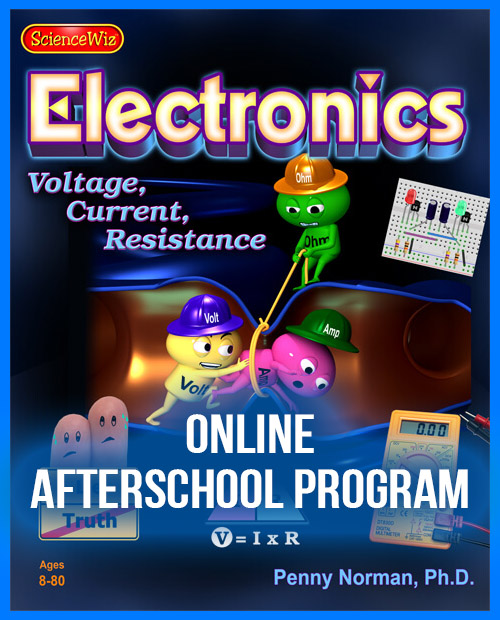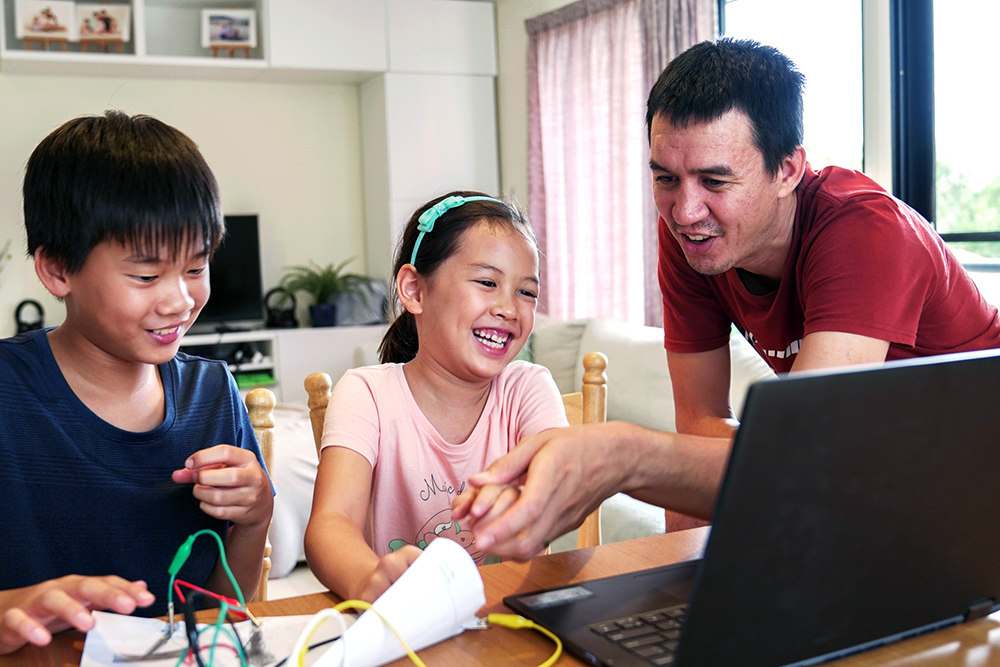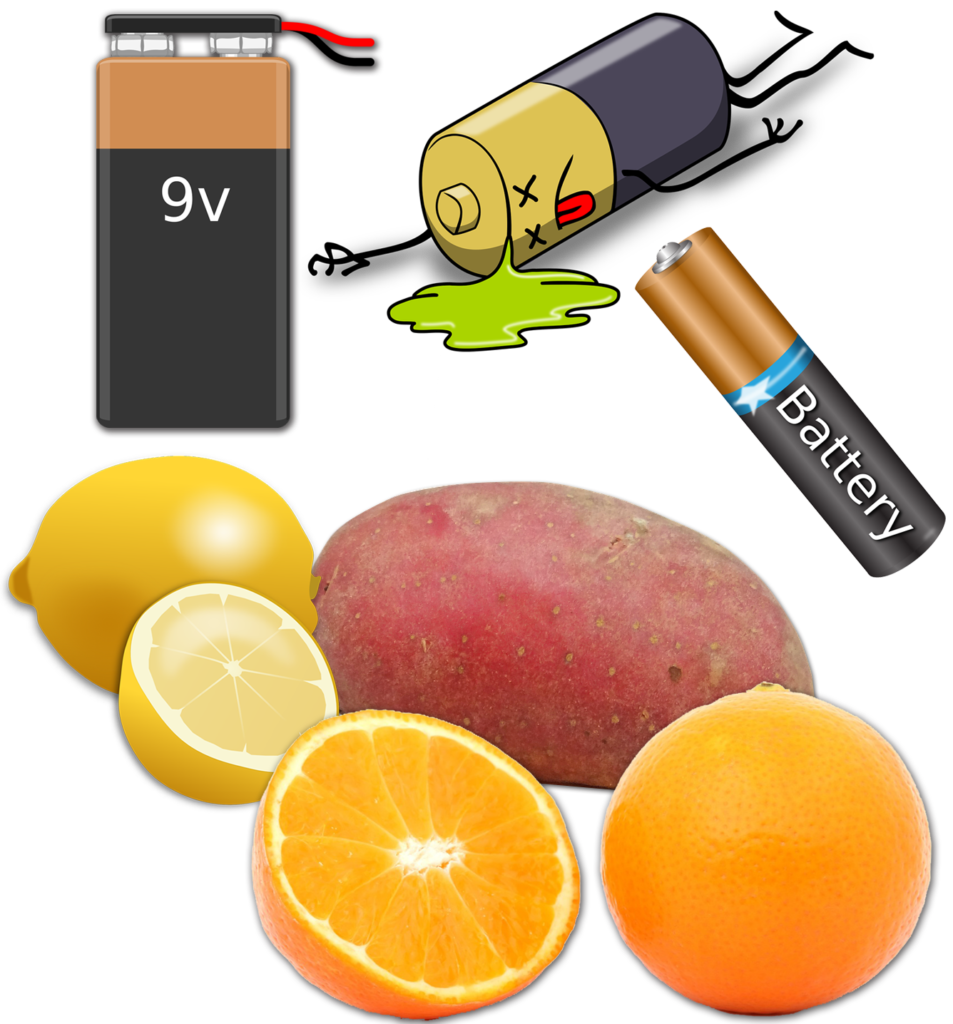

ELECTRONICS
ONLINE AFTERSCHOOL PROGRAM
A Virtual STEM Afterschool Program Explores ELECTRONICS
Key materials for HANDS-ON projects provided
- ELECTRONICS for BEGINNERS is taught 1 day per week for 10 weeks.
- Duration: Each meeting includes a 60 minute interactive live Zoom session.
- Extended activities: At least 1 additional hour of activities may be explored before the next scheduled Zoom session.
- A Zoom link to the afterschool program is provided with purchase.
- Each attendee is sent a companion book and kit uniquely configured for this program.
Age: 3rd grade and up
Price: $200.00 + Materials ($30)
NOTE: There is an additional ONE TIME fee for a mobile phone or tablet stand ($15) that allows the instructor to view the attendees work surface directly. This SECOND camera lets the instructor observe each circuit closeup and facilitates debugging and mentoring. The stand is reusable with all ScienceWiz Afterschool Programs and Camps.
To enroll, please contact the office for schedule and availability.
WHAT STUDENTS WILL DO
Want to build a lie detector and blinking LED lights? Now is your chance! Join this ScienceWiz® Electronics afterschool program for beginners and start building. Includes an engaging set of hands-on experiments tested over many years in ScienceWiz® afterschool programs and camps. These hand-on projects are combined with instructive and compelling virtual experiences and live Zoom mentoring.

Have you ever built a potato battery or a voltage pile? WHAT do these projects have to do with electronics? Use the multimeter that we supply and find out! Learn about voltage, current and resistance and how to measure these fundamental units of electricity.
On to building your first breadboard circuit. Begin with just three electronic components to make a touch sensor. Discover how transistors work –– it’s one of the most important building blocks of modern electronics. Where would you be without them? Build an oscillator to make a light blink. Add LEDs and a few more components and you are on your way to making LEDs do beautiful things. Now build a lie detector! How difficult is it to tell if someone is lying? Join us and find out.

FIRST START WITH THE BASICS
- Basic electricity concepts. Use your multimeter to compare the voltages on new and used batteries. As you stack a voltage pile, measure its growing voltage. If you want a higher voltage, do you connect batteries in series or in parallel? Solve circuit challenges. Use the online circuit construction kit to build circuits.
- What IS voltage? Apply the water faucet metaphor. Now onto current. Measure the current flowing to a buzzer from your potato battery. Does the current increase when one potato battery is connected to another in series? One potato, two potatoes . . . ! What if they are connected in parallel? Current-IN equals current-OUT.
- Make a resistor and measure its resistance. Make a light dimmer with your own resistor. Measure how it varies. Protect an LED from burning out. What do the stripes on a resistor stand for? Verify your calculations with your multimeter. Use an online app to decode the stripes.
- Make your own continuity tester. What is connected to what? Make and solve circuit puzzles. Is this wire broken? Test it –– continuity testing with a multimeter.
- Circuit breakers and overloading a circuit in your house. POP! Lights out. Are all wires equally OK for all currents? Hmmm. Gotta know that one. Let’s get practical. Put it all together with Ohm’s Law.

THEN GO ON TO BUILDING CIRCUITS
- Build a touch sensor. Why does it work? WHAT does a transistor DO?
- Make a oscillator and blink an LED ON and OFF.
- Make a light flasher that blinks LEDs in patterns.
- Build your own lie detector.
- Test it. How can you manipulate it to fool your friends? More about detecting lies. Can lies be detected?
This immersive afterschool program introduces attendees to the world of electronics. It begins at the beginning and by combining favorite hands-on projects with a multimeter, students build a foundation for assembling and debugging circuits. They go on to construct real circuits using a breadboard, no soldering required. Interactive simulations, games and highly-visual online experiences develop an understanding of the WHY, as well as the HOW. Through the live online sessions, students gain confidence and participate with others to learn, share and grow.
MATERIALS NEEDED BEFORE THE PROGRAM BEGINS
MATERIALS (See your welcoming email following enrollment for details.)

- 2 new 1.5 V, as well as used batteries (can be AA, AAA, C or D cell)
- 1 9-V battery
- 3-6 pennies,
- 1 sheet of notebook paper
- vinegar and a small cup
- aluminum foil
- 1-2 potatoes or lemons
- 1 No. 2 pencil
- scissors
- small piece of wood or craft stick
- piece of cardboard or shoe box lid, at least 6 inches (10 cm) square
TECHNOLOGY
- Desktop, laptop or tablet: must include a speaker and a camera AND
a second mobile phone or tablet camera for detailed observation of the projects being built - Internet access
- Zoom application installed
- Signed in with your child’s name
- Unmuted (the instructor will manage class muting/unmuting)
HERE ARE THE STEM TOPICS EXPLORED IN THIS PROGRAM

- The use of a multimeter to measure voltage, current and resistance
- The understanding of these basic variables in terms of the water hose metaphor
- The corresponding units of measurement: volts, amps and ohms
- Continuity testing — you cannot build a robot or debug a circuit without it
- Ohm’s law
- Watts and power
- Practical knowledge about household wiring and circuit breakers
- Building some basic circuits on a breadboard
- Basic electronic components: resistors, capacitors, transistors and LEDs
INCLUDES AWARD WINNING SCIENCEWIZ® BOOKS & KITS

COMMENTS FROM AN AUSTRALIAN

“This kit is an excellent resource. The companion booklet has quite a bit of content and provides interesting project opportunities for young and old(er) alike to engage in some solid electrical basics. I also like the availability of further activities provided online. This is more than just a starter kit with the included multi-meter, dc concepts can be proven as well as seen.”
— Tony J., Reviewed on petersofkensington.com.au
